Natural sun tanning is very beneficial for the body and skin. The sun’s rays stimulate the production of vitamin D, the “sunshine vitamin”, which is vital for us for the good condition of bones, skin, hair, and for hormonal balance. The sun’s rays also contribute to the production of melatonin, a natural antidepressant. 
But you need to sunbathe wisely, because it is not worth overdoing it, and we risk getting sunburn, accelerated ageing and dehydration of the skin. Everyone knows that in order to achieve a beautiful tan, it is necessary to use special products that protect against burns and dry skin, and also contribute to the production of melanin, as a result of which the skin acquires a beautiful bronze tint. A beautiful tan and smooth skin is the desire of any person, especially in summer, when everyone is wearing open clothes. In pursuit of this, many spend a lot of time on the beach or in the solarium.
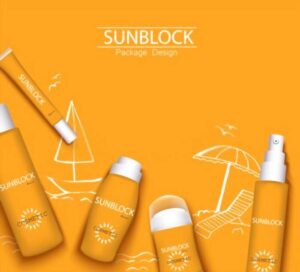 There are many protective products, but lately more and more experts are inclined to believe that not all sunscreens are useful. Moreover, it is the massive use of sun protection that has led to an increase in the incidence of melanoma in recent years. According to the US National Cancer Institute, the incidence of melanoma is increasing by 1.9% every year. This is due to our unconditional belief that a high SPF cream protects us from the harmful effects of the sun. We lie for hours in the open sun, smeared with cream from head to toe, and do not suspect that the cream stops only one type of sun rays. It has long been believed that the most dangerous is type B ultraviolet radiation, it quickly causes burns and provokes cancer. But studies have shown that the consequences of this radiation are not so serious: during the healing process of the burn, the skin comes off along with damaged cells. The real threat is actually type A radiation, it penetrates into the deep layers of the skin and is a catalyst for the development of melanoma. Some people may argue that modern means protect against both types of radiation, but here, too, not everything is so simple.
There are many protective products, but lately more and more experts are inclined to believe that not all sunscreens are useful. Moreover, it is the massive use of sun protection that has led to an increase in the incidence of melanoma in recent years. According to the US National Cancer Institute, the incidence of melanoma is increasing by 1.9% every year. This is due to our unconditional belief that a high SPF cream protects us from the harmful effects of the sun. We lie for hours in the open sun, smeared with cream from head to toe, and do not suspect that the cream stops only one type of sun rays. It has long been believed that the most dangerous is type B ultraviolet radiation, it quickly causes burns and provokes cancer. But studies have shown that the consequences of this radiation are not so serious: during the healing process of the burn, the skin comes off along with damaged cells. The real threat is actually type A radiation, it penetrates into the deep layers of the skin and is a catalyst for the development of melanoma. Some people may argue that modern means protect against both types of radiation, but here, too, not everything is so simple.
Almost all of the proposed products contain a huge amount of chemicals that cause considerable harm to the body and can provoke cancer. Research by the American non-profit organization Environmental Working Group in the field of researching the sunscreen market revealed in 2010 that of the 500 products reviewed, only 39, that is, less than 8%, were completely safe. So there is a very high risk of purchasing the wrong product. Just look at the ingredients of the available sunscreen products. Although many chemical additives serve as UV filters, they still entail other risks: 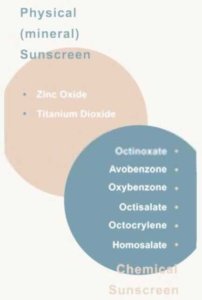
Oxybenzone, benzophenone-3 (Oxybenzone) – this substance enters the bloodstream and accumulates in the body. Potential threat to the endocrine system, causes hormonal disruptions, the appearance of estrogen-dependent tumours, the development of endometriosis.
4-Methylbenzylidene camphor (4-MBC) – this substance also enters the body via the bloodstream and accumulates there, entailing the same risks as the former.
Octyl Methoxycinnamate – penetrates into the bloodstream and accumulates in the body, reduces reproductive capacity in men.
Octocrylene – can cause allergies and hormonal changes. This substance is potentially carcinogenic and also harmful to the environment.
Avobenzone – scientists at the Department of Chemistry at Moscow State University found that this (generally safe) substance decomposes in contact with water and forms more dangerous toxic compounds. These include the compound chloroacetophenone, which is part of the tear gas mixture used by police to disperse demonstrations.
Retinyl palmitate, vitamin A (retinol) – an antioxidant that slows down skin ageing. However, 2012 research by the US National Poison Control Program found that this product, when applied to the skin and exposed to sunlight, can cause cancer.
Another important contradiction: by applying ultraviolet protection to the skin at the slightest appearance of the sun, we deprive ourselves of the very beneficial properties of vitamin D, and a deficiency of this vitamin increases the risk of osteoporosis and cancer.
What to do about this vicious circle? On the one hand, we want to protect ourselves extra against the harmful influence of the sun’s rays and minimize the risk of skin cancer, while other problems and an increased risk of cancer can arise as a result.
 The answer is more obvious than you may think – use a natural oil with sun protection factor. Natural oils have a wide range of benefits, they provide much better skin care, nourish the skin with vitamins and give it a healthy look and glow that will already set you apart from the sunbathing crowd on the beach. Sunburn is the skin’s response to ultraviolet light. Under the influence of UV light, the skin cells produce the protective pigment melanin. However, if more ultraviolet light is absorbed than melanin is produced, skin redness and blistering and, in the worst cases, melanoma will develop. Sunscreen is necessary to protect the skin, but at the very least it must be a harmless product. The natural oils with SPF factor significantly outperform synthetic sunscreens in many ways.
The answer is more obvious than you may think – use a natural oil with sun protection factor. Natural oils have a wide range of benefits, they provide much better skin care, nourish the skin with vitamins and give it a healthy look and glow that will already set you apart from the sunbathing crowd on the beach. Sunburn is the skin’s response to ultraviolet light. Under the influence of UV light, the skin cells produce the protective pigment melanin. However, if more ultraviolet light is absorbed than melanin is produced, skin redness and blistering and, in the worst cases, melanoma will develop. Sunscreen is necessary to protect the skin, but at the very least it must be a harmless product. The natural oils with SPF factor significantly outperform synthetic sunscreens in many ways.
Which oil suits your skin best?
Every skin reacts differently to exposure to ultraviolet light, depending on the skin type. When choosing the right tanning oil, you should take into account the photo type of your skin. These can generally be divided into the following types: 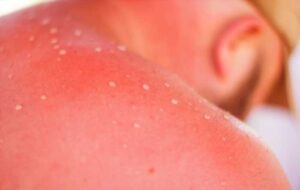
1. Celtic skin. People with red or light blond hair and very light sensitive skin. Freckles usually appear on the face, neck, décolleté and arms from sun exposure. This skin type burns quickly, usually does not tan and should use standard products with a protection factor of 50+. The not yet fully developed children’s skin is also included in this type.
2. European fair skin. People with blond hair and light eyes. The skin is light and burns quickly, but can take on a golden honey hue over time. During the first days of sun exposure, protection of SPF50+ is recommended, once the skin is slightly coloured, you can switch to SPF30.
3. European dark skin. In people with dark blond or brown hair and brown eyes. This skin is already somewhat tinted by nature, can burn slightly on first exposure to the sun, but eventually gets a nice, even shade. SPF20 is recommended for this skin type.
4. Mediterranean skin. This skin type is naturally more toned and goes with dark hair and eyes, and tans very quickly. It is recommended to use a protection factor of 10 to 20.
In addition, there is the dark-toned or brown-yellow Asian skin type – which hardly ever burns and quickly becomes a deep tan – and the very dark to black Negroid skin of African descent, which has a natural protection against sunburn. Both go together with black hair and dark eyes.
Natural oils and their sun protection factor
Natural oils can be classified according to their respective protection factor. In addition to preventing sunburn, they regulate the moisture balance in the skin, stimulate the production of melanin and antioxidants, and help to get a healthy even tan.
Carrot seed oil 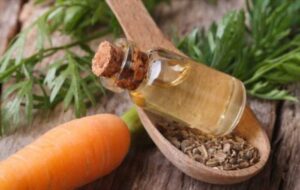
This oil is one of the best natural sunscreens, with a protection factor of SPF 38-40. It is just as effective as the widely available sun products, but without the addition of harmful chemical additives. This nourishing oil promotes the production of melanin, makes the skin perfectly smooth and ensures an even bronze colour.
Wheat germ oil
Natural wheat germ oil, with an SPF20, protects the skin extremely effectively. It contains antioxidants and vitamin E, which promote skin renewal and prevent damage from ultraviolet radiation. In addition, this oil nourishes and moisturizes the skin, and helps to get rid of fine lines and wrinkles.
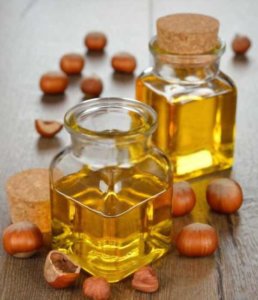
Hazelnut oil
This oil has a SPF11 protection factor. It has a regenerating and softening effect on the skin, soothes the skin after sunburn, restores the skin’s lipid barrier.
Almond oil
The protection factor of this oil is SPF 5-6. It is rich in vitamin E and helps to keep the skin young and soft. Almond oil is ideally suited for dry skin, has a moisturizing effect and does not dry out the skin.
Jojoba oil
Protection factor SPF4. Jojoba oil contains a large amount of vitamin E, an antioxidant that helps neutralize free radicals. This oil penetrates deep into the skin, stimulates the production of collagen and elastin, makes the skin elastic, smooths wrinkles, and helps to get rid of stretch marks and cellulite. Jojoba oil creates an invisible layer on the skin to prevent moisture loss, but allows the skin to breathe. In addition, it prevents premature skin ageing and reduces the risk of skin cancer. This oil optimizes the absorption of vitamin D and the production of melanin when exposed to the sun.
Coconut oil
With a protection factor of SPF 2-4, coconut oil is an excellent tanning agent. It has the ability to retain moisture in skin cells, which is of great importance during tanning sessions. Coconut oil prevents the skin from drying out and nourishes it perfectly. However, the protective properties of this oil are short-lived and should therefore be applied several times a day.
Sesame oil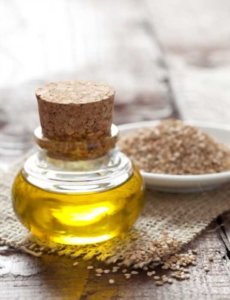
Thanks to the fact that sesame oil “absorbs” the sun’s rays, it is an effective filter of UV rays. It is a widely used ingredient in sun creams and lotions, although the protection factor is said to be only 2 to 5. Sesame oil is rich in polyunsaturated fatty acids and trace elements, and it contains sesamol, a natural active ingredient that prevents oxidation processes. This oil nourishes and moisturizes the skin, and restores the protective functions of the epidermis.
These oils can be used in combination with each other to enhance their respective effects and prevent drying or irritation of the skin. The mixing ratio can be adjusted according to personal preference. Adding essential oils to these base oils can also provide extra protection. However, the highly concentrated essential oils should be applied with caution, just a few drops are sufficient. Essential oils such as rose, lavender, sandalwood, mint or patchouli are suitable for use in sun protection.
Natural oils – tanning enhancers
Walnut oil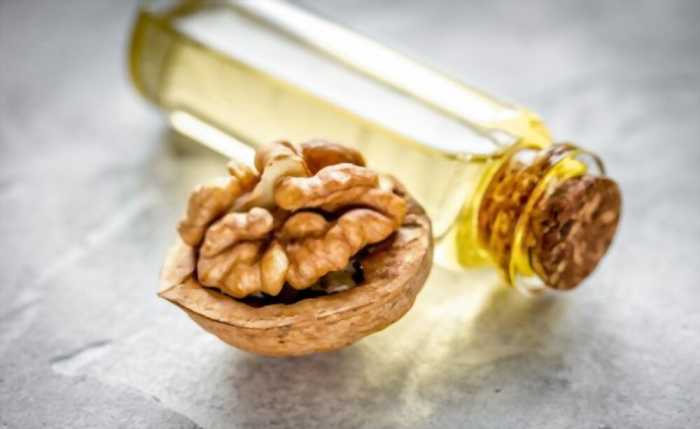 It is called a tanning activator, and it helps to give the darkest tan. It is best to apply it on damp skin about an hour before sun exposure. Before going out, pay attention to the skin – it should be nourished, but not oiled. Can be additionally applied to dry skin areas. A nice bonus – it does not need to be updated during the day, a one-time application is enough.
It is called a tanning activator, and it helps to give the darkest tan. It is best to apply it on damp skin about an hour before sun exposure. Before going out, pay attention to the skin – it should be nourished, but not oiled. Can be additionally applied to dry skin areas. A nice bonus – it does not need to be updated during the day, a one-time application is enough.
Carrot seed oil
This oil has a versatile effect: it protects the skin, stimulates the production of melanin, has a high protection factor and provides a deep bronze hue.
Coconut oil
Coconut oil “attracts” tanning, it is used by those who want to tan quickly and easily.
Tanning advise using natural oils
- Before the first use, do a test on your skin, for example in the inside of your elbow. Wait a few hours to make sure there is no unwanted skin reaction.
- Before tanning, you should take a shower, but do not wipe the skin dry, just pat it lightly with a towel. Apply the mixture warmed in your hands to the body with gentle movements. If you can’t take a shower, just moisturize your skin with boiled water or green tea.
- The first tanning sessions should be extremely careful. Limit yourself to 15 minutes on the beach, and then gradually increase the time each day. The fact is that the sun’s rays accelerate the formation of free radicals that provoke skin ageing.
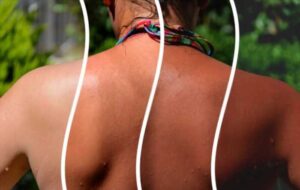 The body needs time to accumulate melanin and antioxidants to protect the skin from the harmful effects of free radicals.
The body needs time to accumulate melanin and antioxidants to protect the skin from the harmful effects of free radicals. - For the first days at the beach, use the oils that are most protective. Please note that even minimal skin redness is a blow to the immune cells of the skin, the cause of early ageing and pigmentation.
- If you have oily skin, do not use oil on your face, otherwise there is a risk of clogged pores. A fluid or milk will do.
- The ideal time to sunbathe safely before 10 am and after 5 pm. During this time, the sun is less aggressive, which reduces the risk of burns.
- Do not forget about protecting your hair, which becomes dry and brittle under the influence of the sun. Oil mixtures are multifunctional, they can be applied not only to the body, but also to the hair (in a few drops), thus protecting the hair from the sun and seawater.
In conclusion, we want to say that it is high time to accept the fact that having a sunburn is not a sign of health. A beautiful tan will be washed off after 2 weeks, and damage to the deep layers of the skin will remain with you forever. A safe tan is a huge work, you need to approach it responsibly so as not to harm your skin. We hope that our review will help you make the right choice of sunscreens. But also use the chosen means in combination with a wide-brimmed hat, with light covering clothes, dark glasses and being in the shade.
Take care of yourself!
